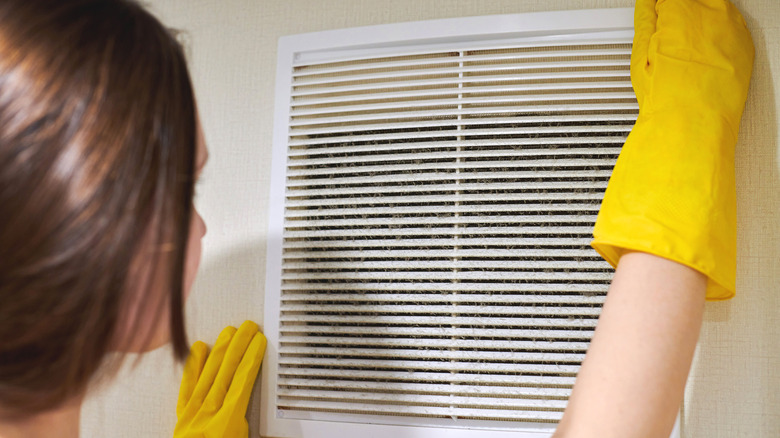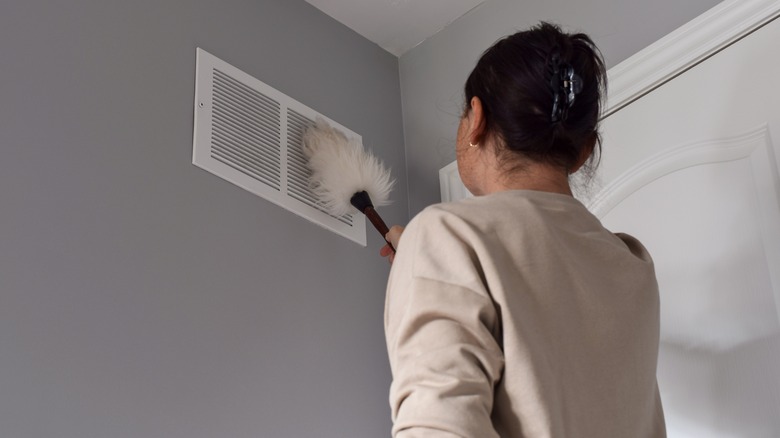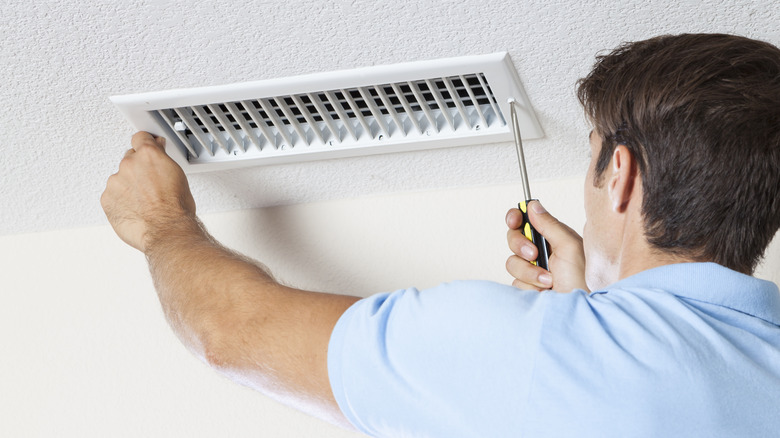Why Your Air Vents Need To Be Cleaned More In The Summer
In the dog days of summer, the continuous flow of cool air streaming throughout your home can create a heavenly reprieve from hot and humid weather. While things are melting outside, your home's central air conditioning is working overtime to maintain a safe environment inside. Or is it? Constant use of your whole-home air conditioning can increase the accumulation of dust and debris in and around HVAC vents which can decrease air quality. To avoid triggering allergies or compounding respiratory issues, it's vital to clean your air vents more often during the summer months.
When was the last time you took a good look at your home's air vents? In most households, a careful examination doesn't typically take place unless something goes wrong and the icy air that's supposed to be pouring out of the metal openings suddenly stops. That's when temperatures — and emotions — start to rise. To avoid heated debates regarding who's to blame for not taking care of the vents, it's a good idea to implement a proactive cleaning routine.
The importance of clean air vents
Central air conditioning systems push warm air over cold coils and deliver the chilled result out of vents and into your home's living spaces. The shape, size, and location of air vents vary according to individual HVAC designs; however, most are found on walls, floors, and ceilings. There are two types of air vents: supply and return. The former dispenses conditioned air throughout your home, while the latter essentially does the opposite by drawing air into the system to cool it.
Supply vents are easily identified by their adjustable slats which allow you to aim arctic air in your desired direction. Meanwhile, return vents are distinguishable by their large size and stationary slats. The process of air supply and return happens constantly and concurrently in order to circulate air through the HVAC system. So, it's common for vents to fill up with a cornucopia of nasty allergens, including dust, dirt, pollen, mold, pet dander, and even pest droppings. That's right; each time your air conditioner kicks on all those contaminants can circulate through your home potentially causing respiratory issues, headaches, rashes, and sore throat. Additionally, gunk build-up in air vents can compromise the integrity of your HVAC system, possibly resulting in higher energy bills or costly repairs. To avoid this, it is a good idea to routinely clean your air vents, especially during the summer months when many air conditioners are working around the clock.
How to clean your home's air vents
If you notice diminished airflow, visible dust, black marks on the vents, or detect a musty odor, it's time for a cleaning. During the summer aim to complete a light cleaning at least once a month, especially if you live with a smoker, pets that frequently shed, or housemates with allergies or asthma. Simply run a microfiber duster, cloth, or a slightly moist Mr. Clean Magic Eraser along the vent's slats to remove any debris that has collected on and around the louvers. Another option is to place the brush attachment on your vacuum cleaner and use it to suck up debris on grille covers.
A deeper clean should take place at least twice a year; ideally once in the spring before a summer of prolonged air conditioning use. To start, turn off the HVAC system. Next, carefully remove the vent cover with a screwdriver. Once the grate is detached, soak it in hot, soapy water in a bathtub or sink. After a few minutes, use a soft-bristled brush to gently scrub off any remaining grime. To avoid damaging the vent cover's paint job, don't soak it for an extended period of time and resist scouring the slats. For stubborn stains, lightly wipe them with a soft cloth dampened with rubbing alcohol. Finally, allow the covers to dry completely and replace the unit's air filter prior to reattaching them.


